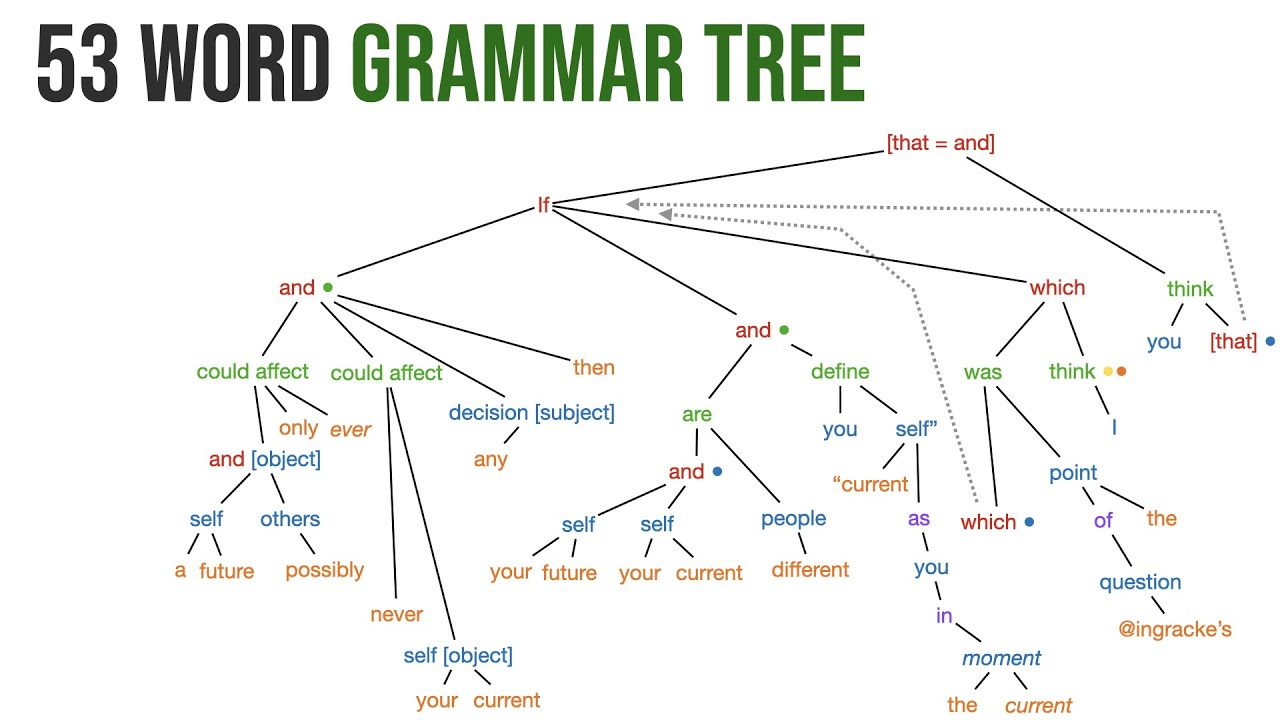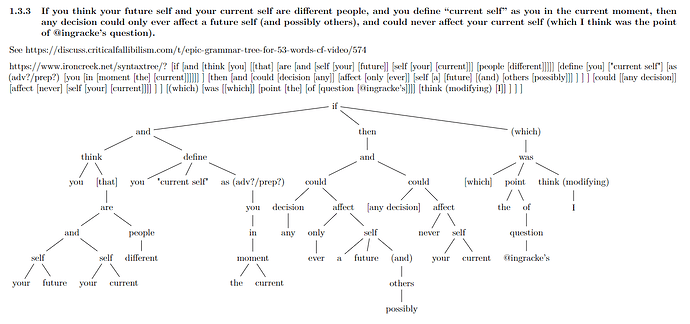Unlisted original video with flicker issue
I liked the way you build the tree down in layers. Seems like a good way to handle complex sentences.
I thought it’d be fun to try doing the tree before watching the vid. Here’s my tree and some differences with @Elliot’s for anyone interested.
There are some superficial differences:
- I map “if X then Y” as
[if [X] [then [Y]]]instead of[if [Y] [X [then]]]. - I have “you define A as B” like
[define [you] [A] [as [B]]]– “as B” is adverbial and modifying “define”. I’m not sure if that’s strictly correct but it makes sense to me, and the meaning is nearly the same either way. - I have the “I think” interjection modifying “was” instead of the root “which”.
- I didn’t break down ““current self”” but did break down “could affect”.
- I had “never” modifying “affect”, but reconsidering it now I think it should modify “could”
- I had an implied “[any decision]” as the subject of the second “could affect”.
- With “could only ever affect”, I had “only” modifying “could” (b/c “could only affect” makes sense), and “ever” modifying “only” (b/c “could ever affect” doesn’t make sense).
- I handled the first parenthetical a bit differently (as a sort of modifier)
Having gone through them now, there are more differences than I expected.
Also, I notice that, despite a decent number of differences, the structure is almost the same.
Edit: also, I timed myself – doing the above tree took 20 minutes, and I had to spend a few more minutes to get it to render correctly (also, the jssyntaxtree doesn’t render quite correctly, but here’s the link)
Reasons for the way I do it:
- “then” is just a regular adverb, not a conjunction or anything special. Also, to reinforce the non-specialness, in general with if/then statements, the “then” is actually optional, not mandatory.
- I have a general policy of putting the main clause before the subordinate clause. This matches the order in the majority of sentences. E.g. “I ate fish because I like fish.” has the main clause first. It also doesn’t need a comma which is a hint it’s more standard (reordering stuff away from the standard order is a common reason to need one or more commas).
I had “never” modifying “affect”, but reconsidering it now I think it should modify “could”
Yeah, if you split the verbs up into separate nodes then you’ll most typically want to apply the adverbs to the main, finite verb.
I have “you define A as B” like [define [you] [A] [as [B]]] – “as B” is adverbial and modifying “define”. I’m not sure if that’s strictly correct but it makes sense to me, and the meaning is nearly the same either way.
https://www.reddit.com/r/grammar/comments/un0uk5/asking_what_a_preposition_modifies/
i don’t really know. i asked reddit but they haven’t been much help so far.
I thought it’d be fun to try doing the tree before watching the vid.
People will learn more if they practice doing their own trees before seeing my solutions. (If it’s too hard, don’t keep trying a bunch. Trying some and not knowing how to do it will help you learn more from my solution. That’s fine. And practice some easier ones when you get a chance.)
I liked the way you build the tree down in layers. Seems like a good way to handle complex sentences.
Yeah I’m happy with it. I’m trying to break philosophy stuff down into simple enough steps that ~anyone could do it (with some study/effort/practice but with no need for genius, cleverness or pre-existing good intuitions).

